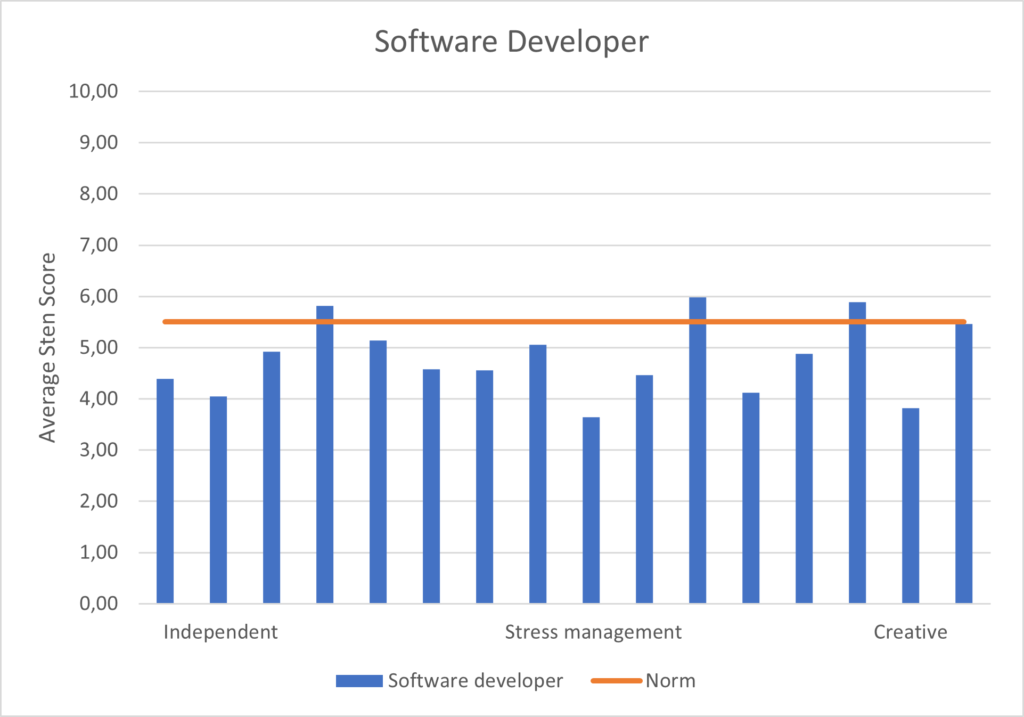In software development, the demand for technical expertise is undeniable. The ability to code and debug software solutions forms the foundation of a developer’s skill set. While strong hard skills are crucial, soft skills play a significant role in developers’ overall effectiveness and success. For hiring managers and talent professionals, it is essential to understand the soft skills and personality traits of job applicants in developer roles for effective recruitment and identifying the right fit for the organization. In this article, I will explore the personality trait analysis of software developers and discuss how you can utilize these findings for better recruitment and people management.

Why do soft skills matter for software developers?
Soft skills refer to personal attributes, traits, and abilities that relate to how you interact with others, solve problems, and manage your work. Soft skills are also closely associated with an individual’s ability and willingness to learn new skills and concepts. Overall, soft skills complement technical skills in software development.
Clevry’s software developer personality assessment is developed through extensive knowledge of psychometric assessments and years of scientific research, measuring the soft skills identified as core competencies in a software developer role. The personality traits measured in the assessment include:
Interpersonal style
- Approachable
- Independent
- Direct
- Listening
Emotional style
- Self-sufficient
- Stress management
- Optimistic
- Self-development
Motivational style
- Originality
- Striving
Thinking style
- Detail focused
- Rigorous
- Structured
- Creative
Let’s take a closer look at three traits that most deviate from the norm (5,5). These findings indicate what the candidate market in software development roles looks like today and should be considered when hiring for developer roles.

Stress management: Software development is a highly cognitively intensive job and can be very stressful due to high client expectations and tight project deadlines. Our data shows that job applicants in software developer roles exhibit lower stress management scores (-1.86)Share this: . Of course, the stress levels associated with a developer job can vary depending on several factors, including the specific role, work environment and personal circumstances.
By offering adequate stress management resources, encouraging work-life balance, managing workloads and providing mental health support when needed, companies can maintain healthy stress levels and prevent their employees from burning out.
Creative: While software developers can rarely enjoy complete freedom of expression like artists, being a developer requires a lot of creativity (within the constraints of technology and product requirements). Software developers need creative problem-solving and outside-the-box thinking to overcome obstacles when building new applications. According to our data, software development candidates show lower tendencies in creativity (-1.68).Share this:
When hiring software developers, remember that creativity is a multifaceted trait, and individuals can exhibit creativity in different ways, such as finding innovative technical solutions or approaching problems from a unique perspective.
While some creativity is good for software developers, balance is the key. Consider how scoring very high on the creativity scale might look on the job – would that person have trouble staying within the standard practices, be prone to create overly complex solutions or be resistant to feedback and collaboration? Clevry’s interviewer report can help you tap into these questions more deeply in an interview to unearth the desired behaviours in your candidates. The amount of “artistic freedom” needed also depends on the projects at hand – is the goal to build an effective and functional solution or explore unconventional ideas to create something novel?
Independent: While software developers are often stereotypically seen as nerdy loners (thanks to popular culture), that image is far from the truth in today’s professional world. Software development often involves working in teams to solve complex problems; hence the ability to collaborate effectively with others, communicate ideas and align efforts towards a common goal is crucial.
According to our data, software developer candidates score lower on the Independent scale (-1.45), which measures to what extent a person is marching to the beat of their own drum and are willing to compromise with others. The amount of autonomy and independence needed can vary depending on specific contexts, team dynamics and organizational culture.
Check out our scale library for a more detailed description of the scales.
Hire better with soft skills assessments
Understanding the personality traits of job applicants in software developer roles is crucial for building cohesive and high-performing teams. Each individual brings a unique set of skills and competencies to the table. Thus, a holistic approach that considers both hard and soft skills, along with a nuanced understanding of the individual’s personality traits, can help organizations build diverse, balanced, and effective software development teams. Understanding these dynamics will improve the hiring process and contribute to better people management, fostering a supportive and productive work environment.
Tools like Clevry’s personality assessments can provide valuable insights and guide hiring managers and talent professionals to make more informed hiring decisions. You may want to measure different tendencies depending on your company’s competency framework, culture and values. If this is the case, see how Clevry can help you build bespoke assessments to measure exactly what you’re looking for to tap into those critical attributes.
View the output from Clevry assessments by downloading sample reports below.



